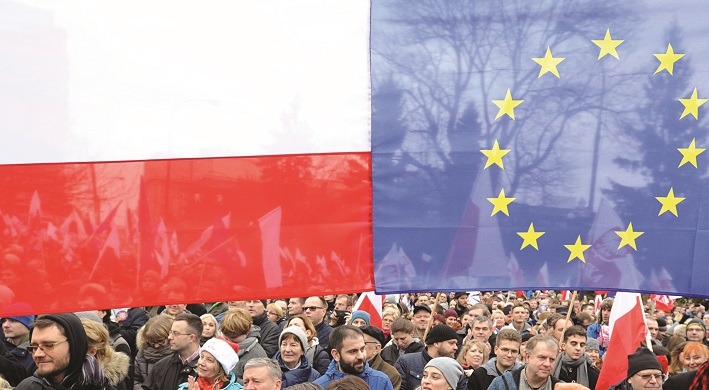We have seen it before in other countries - democratic elections resulting in a new government with an absolute or slim majority in the parliament. Although only a minority of voters supported the government party – or the lead party if it’s a coalition government - the new government embarks on far-reaching policy changes while ignoring the opinion of the second half of the population. In the worst scenario, such regime changes may result in an illiberal democracy or authoritarian rule.
The latest example is Poland. Its democracy is in danger. At least so it seems. The past few weeks thousands of Poles have marched in protest against the policies of the conservative PiS (Right and Justice) government. These protests have spread to other European cities as well. In Stockholm, Amsterdam, Berlin, Brussels and many other cities people have joined to express their concerns about the state of democracy in Poland.
Three months ago, PiS convincingly won the parliamentary elections. Since then, the PiS government has taken several measures that many fear are curtailing essential democratic freedoms. But is it really that bad? Is Poland evolving from a democracy to a democratorship (democracy – dictatorship)? The arguments aimed at reassuring us are rather weak and might in fact increase our worry.
Some of the most controversial of the recent measures include: limiting the power of the Constitutional Court; approving political appointments when neutrality should be preserved and possibly strengthening the party’s grip on the media by making a rather infamous PiS politician president of TVP, Poland’s public broadcasting company.
Getting what you want
A frequently used argument in defence of PiS and government parties in other countries, is that they are merely carrying out their programmes and doing what the electorate wants. PiS obtained 37.5% of the votes, leaving other parties in ruin and despair. Nobody can question the legitimacy of this government, which was installed after fair and free elections. Free elections are commonly considered to be the heart of democracy. Seen from this perspective, democracy in Poland is alive and well, not in decline.
Unfortunately, such a view simplifies the meaning of democracy and the results of the elections. Democracy is about more than elections and the will of the majority. And even though PiS obtained an absolute majority in parliament, it’s incorrect to say the controversial measures of the new government are simply what the Poles want.
Voting for a party does not imply agreeing with all the things this party stands for. In the case of Poland, a significant share of PiS votes came from citizens who were fed up with the political establishment. Kukiz’15, another anti-establishment party, also did surprisingly well in the elections. For many disillusioned citizens a vote for PiS was an act of protest – a vote against the establishment rather than a vote in favour of its programme.
A hundred days of totalitarianism?
That PiS is just enacting its programme step-by-step and doing what it promised to do is half a truth. And as Benjamin Franklin observed: “Half a truth is often a great lie”. During the election campaign PiS presented itself in a more moderate fashion. Jaroslaw Kaczynski – a controversial hardliner and the president of PiS – kept a low profile while the (seemingly) more moderate Beata Szydlo came to the foreground.
Since the elections however, Kaczynski’s presence and influence have been more visible again. Many voters wanted to try the light version of PiS, not the old, hard-core one that wants to execute an overly ambitious programme in a hundred days’ time and must take the drastic measures that we’ve been witnessing so far.
Is it possible under democratic rule, one could wonder, for a party, after winning the elections, to roll out its programme in a hundred days, without taking into consideration opposition and criticism? I am inclined to think this is only possible under totalitarian rule. In a liberal democracy, once you have won the elections and have assumed office, you no longer exclusively represent the people who voted for you. You are not the president or prime minister of your supporters, but of an entire nation: a nation in which most citizens didn’t vote for you. Taking the concerns of that share of the population into account is a sign of true democratic leadership.
Democratorship
A democracy has several vital organs. Free elections are important indeed, and so are the institutions that safeguard the separation of powers and a constructive debating culture. The latter are perhaps of even greater importance, in order to avoid a democratorship: the majority one-sidedly imposing its will on everyone.Without dialogue there is no democracy. Democracy is a state of mind that represents openness towards the other and awareness that making compromises is not necessarily compromising your beliefs. The quality of a democratic politician is measured not by the boldness of his statements, but by his ability for self-reflection and openness to the views of others.
A case in point is PiS’s euroscepticism. This is not unusual in the European Union considering its current crises and performance or rather lack of performance in solving them. There are good reasons to be critical of the European Union, but the way in which PiS promotes intense anti-EU sentiments by channelling, in particular, Poland’s historic distrust of Germany, could be highly detrimental to the relationship between the EU and Poland.
What does the appointment of a politician as president of Poland’s public broadcasting corporation say about the need for dialogue? This is not your average political appointment or business as usual, as some maintain in order to defend the appointment. As a politician, this person was a controversial hardliner who believed politics is all about polemics. He was such a divisive figure that, even within PiS, many thought he was too radical. That this same man is now running TVP presents a real cause for concern as to whether TVP-journalists will have the freedom to fulfil their roles as watchdogs of democracy.
Trust
Trust is the glue that keeps the different actors in a democracy together. Trust between those who govern and those who are governed is indispensable. The repeated controversies and protests in Poland serve simultaneously as reassuring evidence of the vitality of Polish civil society and as evidence of a troubling lack of trust between government and society. Earning this trust through moderation rather than polarization should be the top priority of every democratically elected government. The Polish government definitely deserves a fair chance to do this.
Democracy implies that you have to tolerate people you thoroughly dislike, even to the point of being governed by these people. But being given a chance to govern does not mean being given a license to do whatever you want. And should PiS fail to understand this, the perilous situation in which Polish democracy finds itself should not be trivialized.
The danger of confidence
Meanwhile, several leading European politicians, including the presidents of the European Commission and the European Council, have advised everyone to keep calm. Things are not as bad as many suggest. But that things could be worse does not imply that they should not be a lot better.
Political vigilance is a central civic virtue and there is great danger in the belief that there is no danger at all: it invites civic complacency when vigilance is needed. Overestimating the things that threaten a democracy always seems wiser than underestimating these threats. This is a view many Poles share. A recent survey of polling organization Ariadna pointed out that fifty five percent of the Polish population thinks the EU justly called the Polish government to account.
On the one hand, that is surprising since the Poles, due to their history of oppression and occupation, are highly sensitive to any possible loss of national sovereignty and meddlesomeness from abroad in internal affairs, and they certainly don’t like to be lectured to by others on how to deal with their own matters. On the other, it shouldn’t come as a surprise, given that more than fifty percent of the population believes PiS’s policies are indeed negatively affecting the freedoms and foundations of democracy.
A liberal democracy is a difficult balancing act, a continuous search for the perfect equilibrium between freedom and security, between the things we have to permit and the things we have to prohibit. Sometimes there is too much freedom, sometimes too much governmental intrusiveness. Leszek Kolakowski, the renowned Polish philosopher, once argued that even though there is no formula to determine what amount of freedom is ideal, there is a useful rule of thumb in a liberal democracy: too much freedom is better than too little freedom.
Therefore, it’s best to keep an eye on what’s happening in the land of the white eagle. Keep calm, and keep worrying.
By Alicja Gescinska


